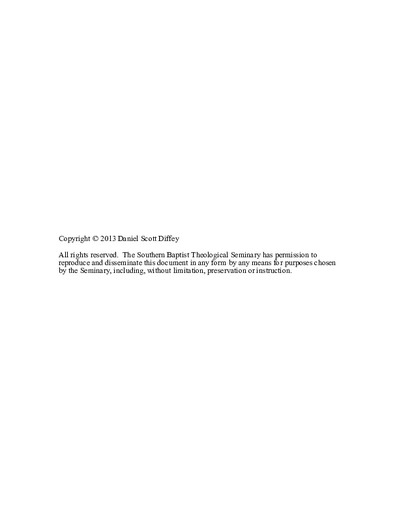| dc.contributor.advisor | Garrett, Duane A. | |
| dc.contributor.author | Diffey, Daniel Scott | |
| dc.date.accessioned | 2013-12-31T15:50:47Z | |
| dc.date.available | 2013-12-31T15:50:47Z | |
| dc.date.issued | 2013-12-31 | |
| dc.identifier.uri | http://hdl.handle.net/10392/4526 | |
| dc.description.abstract | This dissertation seeks to interpret Gideon's response in Judg 8:23 and Jotham's fable in Judg 9:7-15 within the context of the book of Judges. The book of Judges has recently been seen as an apology for the Davidic monarchy. Studies that have advocated this perspective have focused on the prologue (Judg 1:1-3:6) and epilogue (Judg 17-21) where there appears to be a focus on the tribe of Judah and an explicitly pro-monarchial refrain. These studies have largely neglected Gideon's response and Jotham's fable, which have been described by some scholars as two of the most anti-monarchial texts in the entire Old Testament. This dissertation analyzes both the book of Judges as a whole and these two texts in particular, with the aim of establishing the notion that the book of Judges contains a coherent message concerning monarchy from start to finish. Chapter 1 establishes the methodology used in the present study. The methodology employed is a literary-exegetical and theological analysis of the text from a synchronic perspective. Chapter 2 surveys the history of interpretation of the book of Judges with a focus on Gideon's response and Jotham's fable. Chapter 3 places the composition of the book within its life-setting arguing that the book was likely composed during David's early reign. Chapter 4 looks at the ideology of monarchy within the entirety of the book of Judges. Chapter 5 provides a detailed literary analysis of the plot of the Gideon narrative and the characterization of Gideon. This is done to establish the Gideon is an unreliable character and that his response in 8:23 cannot be considered as a theological axiom that is to be trusted. Chapter 6 provides a detailed literary analysis of the plot of the Abimelech narrative along with a discussion of the characterization of both Jotham and Abimelech. This chapter argues that the purpose of Jotham's fable is to serve as a curse against Abimelech and the lords of Shechem and is not anti-monarchial in nature. Chapter 7 provides a summary of the contents of the dissertation with final reflecting thoughts. | en_US |
| dc.subject.lcsh | Bible. Judges--Criticism, interpretation, etc. | en_US |
| dc.subject.lcsh | Gideon (Biblical judge) | en_US |
| dc.subject.lcsh | Abimelech (Biblical figure) | en_US |
| dc.subject.lcsh | Monarchy | en_US |
| dc.title | Gideon's Response and Jotham's Fable: Two Anti-Monarchial Texts in a Pro-Monarchial Book? | en_US |
| dc.type | Electronic dissertation | en_US |
| dc.type | Text | en_US |
| dc.publisher.institution | Southern Baptist Theological Seminary | en_US |

